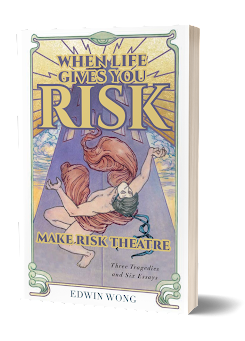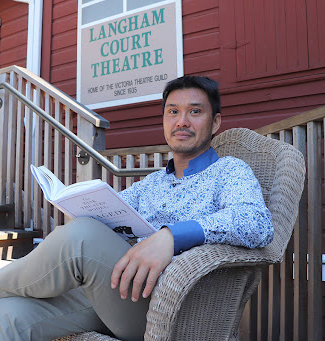Defy the smallness of the stage with the greatness of your daring
VICTORIA, Canada – Do you truly know how to take a risk?
Theatre expert Edw in Wong continues exploring risk, chance and the unexpected in his newest book, When Life Gives You Risk, Make Risk Theatre (Friesen Press, June 7, 2022).
in Wong continues exploring risk, chance and the unexpected in his newest book, When Life Gives You Risk, Make Risk Theatre (Friesen Press, June 7, 2022).
Wong’s first book upended our understanding of theatre by arguing that risk is the dramatic fulcrum of the action. It also launched a major international playwriting competition, now in its fourth year. In his second book, Wong argues that chance is a powerful and misunderstood force that directs the action, both on and off the stage. Inside readers will find three risk theatre tragedies by acclaimed playwrights Gabriel Jason Dean, Nicholas Dunn and Emily McClain.
From the poppy fields of Afghanistan to the motel rooms and doctors’ offices lining interstate expressways, these plays, by simulating risk, will show how theatre is a dress rehearsal for life. Six risk theatre essays round off the volume. In a dazzling display from Aeschylus to Shakespeare, Thomas Hardy, and Arthur Miller, Wong reinterprets theatre through chance and probability theory. After risk theatre, you will never look at literature in the same way.
When Life Gives You Risk, Make Risk Theatre
Edwin Wong | June 7, 2022 | Friesen Press | Performing Arts, Theater
Hardcover | 978-1-03-913510-9 | $20.99
Paperback | 978-1-03-913509-3 | $14.99
Ebook | 978-1-03-913511-6| $6.99
 EDWIN WONG is a classicist and theatre researcher specializing in the impact of the highly improbable. He has been invited to talk at venues from the Kennedy Center and the University of Coimbra in Portugal to international conferences held by the National New Play Network, the Canadian Association of Theatre Research, the Society of Classical Studies, and the Classical Association of the Middle West and South. His first book, The Risk Theatre Model of Tragedy (2019) is igniting an international arts movement. He was educated at Brown University and lives in Victoria, Canada. Find out more about him at risktheatre.com.
EDWIN WONG is a classicist and theatre researcher specializing in the impact of the highly improbable. He has been invited to talk at venues from the Kennedy Center and the University of Coimbra in Portugal to international conferences held by the National New Play Network, the Canadian Association of Theatre Research, the Society of Classical Studies, and the Classical Association of the Middle West and South. His first book, The Risk Theatre Model of Tragedy (2019) is igniting an international arts movement. He was educated at Brown University and lives in Victoria, Canada. Find out more about him at risktheatre.com.
Follow Edwin Wong on social media:
Facebook: @EdwinCharlesWong | Twitter: @TheoryOfTragedy | Instagram: @EdwinCLWong
In an interview, Edwin Wong can discuss:
- The new idea of Risk Theatre and the search for the next great tragedy
- What we can learn about playwriting from tragic literary theory
- The major international playwriting competition this book has launched
- What we can learn about not only theatre but also real life by studying risk
- The impact of unexpected low-probability, high-consequence events in theatre and life
- How risk works in popular modern plays as well as ancient Greek tragedies
- How Shakespeare’s plays are still relevant today because of risk theater
- How chance can be understood within a play
- Three prize winning tragedies including in the book that illustrate risk
- How probability theory plays out on a stage
- Why we have always written stories that involve risk and why we should continue to do so
An interview with Edwin Wong
1. Can you explain what risk theater is in layman’s terms?
In risk theatre, risk takers drive the action. By laying everything on the line, risk takers trigger devastating and dramatic low-probability, high-consequence events. Risk is the dramatic fulcrum of the action. By wagering everything, anything can happen. Risk is inherently dramatic.
2. Can you give an example of how risk works in a popular play?
In Shakespeare’s “Macbeth,” Macbeth wagers all-in on the crown. With Lady Macbeth, he comes up with the perfect plan. Nothing can go wrong. But then, the unexpected happens: Birnam Wood comes to Dunsinane Hill. All is lost. One super exciting thing about my second book is that it includes three risk theatre plays by award-winning contemporary playwrights. It’s fascinating to see how they treat the theme of risk in today’s world.
3. How does this book expound on principles you touched on in your first book?
The new book extends the concept of risk to comedy: Comedy dramatizes upside risk while tragedy dramatizes downside risk. This will be the first time, since Aristotle’s second book of the “Poetics” was lost where he discusses comedy, that we have a unified theory of drama that explains both tragedy and comedy. Incidentally, Aristotle’s lost book on comedy was the subject of Umberto Eco’s popular “The Name of the Rose.”
4. What differentiates your theory of tragedy with other theories of tragedy?
Other theories of tragedy are based on pity and fear (Aristotle), ethical collisions (Hegel), and subconscious drives (Nietzsche). Risk theatre is based on risk because risk is a contemporary topic. As technological, scientific, and political change quickens, the new paradigm is risk. We see risk theatre because we live in a risk age.
5. How does risk theatre tie into risk in real life?
If you look at theatre as a theatre of risk, theatre becomes a dress rehearsal for life. By watching low-probability, high-consequence risk events happen on the stage, we are better prepared for real-life risks and their consequences. The things that are life changing are not the expected events but the unexpected ones.
6. Can you tell us more about the Risk Theatre Modern Tragedy Competition?
The competition is in its fourth year and going strong. It’s attracting international interest, with playwrights from 15 countries — including former Soviet republics — entering. Each year, we workshop and produce a staged reading of the winning play. It’s been a great opportunity to work with talented actors, playwrights, directors and dramaturgs to bring risk to life. A lot of academic theories about drama remain academic. Risk theatre is different: It brings together theory and practice. Risk theatre is launching an international arts movement that is changing how we write, produce and understand theatre.

A former award-winning journalist with national exposure, Marissa now oversees the day-to-day operation of the Books Forward author branding and book marketing firm, along with our indie publishing support sister company Books Fluent.
Born and bred in Louisiana, currently living in New Orleans, she has lived and developed a strong base for our company and authors in Chicago and Nashville. Her journalism work has appeared in USA Today, National Geographic and other major publications. She is now interviewed by media on best practices for book marketing.


One thought on “RISKY BUSINESS: Canadian theatre expert explores unique concept of tragedy for stage, literature”
Comments are closed.